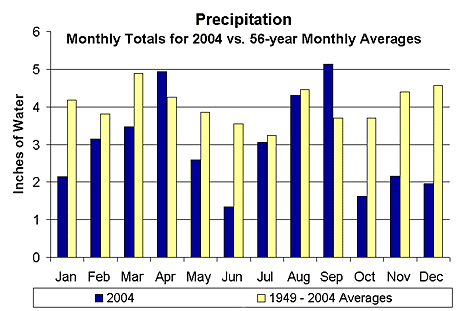Weather of 2004 - Third Driest Year on Record at Brookhaven Lab
January 10, 2005
UPTON, NY - Long Islanders scarcely used umbrellas in 2004, the third driest year on record at the U.S. Department of Energy's Brookhaven National Laboratory. With 35.86 inches of precipitation, 2004 contrasted sharply with 2003, the third wettest year on record, with 63.11 inches of precipitation. The normal yearly precipitation in the area is 48.49 inches.
Brookhaven Lab has been recording weather statistics since 1947. Laboratory meteorologist Victor Cassella characterized the weather of 2004 as consistently within the normal range. "We had no droughts, no blizzards, and no hurricanes on Long Island last year. Snowfall was above average, but we had few extremes in temperature. We never reached 90 degrees, and we had no record low temperatures."

On June 9, the thermometer hit 89.5 degrees Fahrenheit (F), the highest temperature of the year, but not a record for that date. On May 12, the record high reading was 86.5 degrees F, beating the 1991 record of 85 degrees F for that date. On Halloween, trick-or-treaters enjoyed unseasonably warm weather with a high of 73 degrees F, which tied the record for that date set in 1950.
Twenty-three tropical storms and hurricanes developed in the Atlantic Ocean in 2004, of which five hit Florida. Long Island was spared the brunt of these storms, although the area did get tropical effects - wind and rain - from some of the storms.
Total snowfall in the October 2003 to April 2004 snow season was 60.2 inches, well above the average snowfall of 30.4 inches for the winter season at Brookhaven Lab. The 2002-2003 winter season brought 62 inches of snow, making the last two winter seasons the only two consecutive years in which the Laboratory had more than 60 inches of snow.
Cassella correctly predicted last year that we would have "one of our most snowy seasons" during the winter of 2004. For 2005, he predicts normal to slightly above normal snowfall, with a pattern of extremes in temperature during the year.
2005-10264 | INT/EXT | Newsroom









